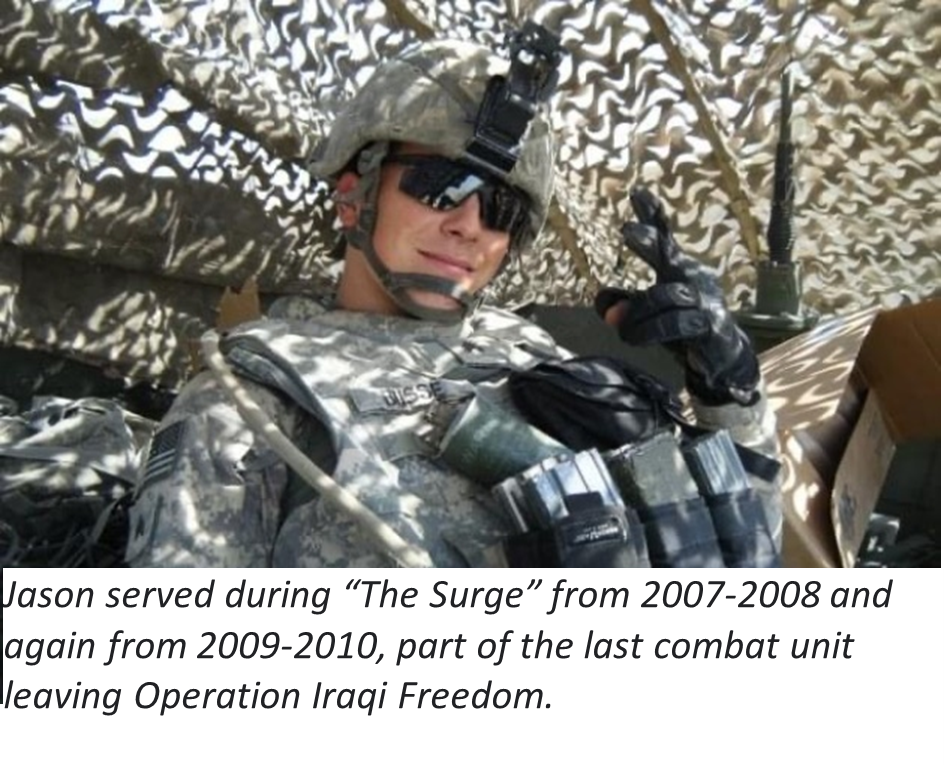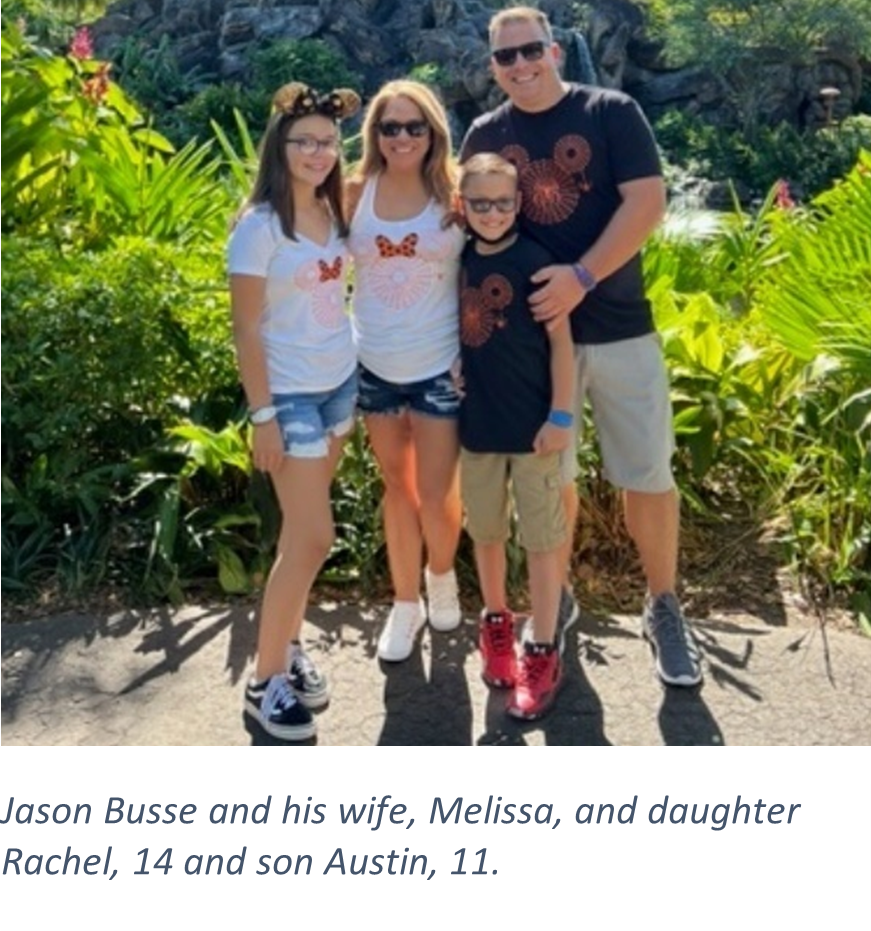
Army veteran Jason Busse shares how he copes with Post Traumatic Stress Disorder (PTSD) after experiencing trauma both at war and in his civilian life.
At the Young Age of 18

Jason, a B-2 flightline operations manager in Palmdale, California, began his military service at 18 years old.
He served two deployments as an infantryman in Iraq on the Quick Reaction Force (QRF). Despite several episodes of heavy mortar fire, he miraculously avoided severe physical injury.
While leading a QRF team of Stryker vehicles, he once ran over a 15-pound fire extinguisher filled with explosives.
“It lifted our 16-ton truck about 10 feet into the air. I slammed on the gas. We were about a half mile from the base, so I got into racer instinct and gunned it into the camp, thankfully stopping before hitting a wall because we had no brakes.”
Jason received an Army Commendation Medal with Valor, an award granted for consistent acts of heroism or meritorious service.
While he was offered two Purple Hearts, he turned them down because, “I didn’t have actual injuries. I wasn’t bleeding or anything like that. I didn’t want to take away from the people who deserve them.”
Sunday, Oct. 1, 2017, at 10:04 a.m.
Following his military service—just six months into his job at Northrop Grumman—Jason endured another trauma.
His wife, cousins and several other relatives were enjoying a Route 91 Harvest Country Music Festival in Las Vegas. During the festival, a high-stakes gambler climbed to the 32nd floor of Mandalay Bay Resort and Casino and opened fire into the crowd of 22,000 people.
It became the deadliest mass shooting in U.S. history. Jason was one of hundreds injured and 60 lives were lost that day.
Jason mistook the first few shots for fireworks. A man near him fell to the ground. Kneeling to aid the man, he noticed, “I can’t feel my arm.” He attributed the numbness to war-related PTSD. It would take a while for him to realize he’d been shot in the arm. As the crowd stampeded for the exits, Jason and his wife got separated. Still exposed to the gunman perched high above them, “I remember crawling around the venue, looking for my wife until I remembered I didn’t have a gun. I decided I needed to focus on helping others get to safety.”
Saving 14 Strangers
Jason guided 14 strangers out of the chaos to safety at a nearby hotel where he found a locked utility closet and kicked the door open. “Probably the coolest thing I’ve ever done.” They hid inside the closet for six hours before they were rescued by hotel security.
The next morning, Jason was reunited with his wife and family at the local hospital. Fortunately, they all survived.

One Community at Northrop Grumman
One of the first calls Jason received the morning after the shooting was from his newly onboarded manager at Northrop Grumman asking him if he was okay. His manager let him know his health and well-being were a top priority. He was told that he could take a leave of absence or work remotely while he recovered.
His human resources business partner offered to take care of all the medical paperwork and connected him and his wife to our Employee Assistance Program, NGCare, to work with a licensed counselor to cope with the traumatic event.
Jason says he felt grateful for how much his team showed they cared about him. “I realized I’m not just a name on a piece of paper here. Even though several team members didn’t even know who I was yet, they treated me with so much respect and care. That’s when I realized that I’m never leaving Northrop Grumman.”
Coping with Traumatic Events
Given Jason’s emotionally traumatic experiences we asked him to share his thoughts on how to help others struggling to cope with flashbacks, PTSD or feelings of sadness.
He replied, “No one can tell you how to handle it.” But for those struggling, he suggests talking about the events and finding your peace. This could be working out, finding a new hobby, or simply taking some time alone to process.
Above all, “Understand what you, your inner self needs, without alienating yourself. Don’t shut people out.”
Jason hopes that by talking about his experiences he might help others suffering from PTSD feel more comfortable sharing their stories. “Northrop Grumman offers a lot of great services for veterans. But no one can help you if they don’t know you’re suffering,” says Jason.
He shared that having a strong support system in his family and a clear understanding of what triggers his emotional responses have helped him the most. “Once you know what triggers you, you’re in control of everything. For me, it’s loud noises, tight areas, overcrowding. I was able to learn these early on.”
While he doesn’t stop doing things that may trigger negative emotions, he takes breaks when he needs to and seeks support from friends and loved ones.
“The birth of my daughter in 2009 helped pull me out of a dark time. It made me realize I had a lot more to live for, memories to make and to be a role model. My wife and daughter saved me. It’s a long road and hard to do it alone.”
Join VERITAS
In addition to a strong personal support system, Jason also has a community of employees supporting him in the VERITAS employee resource group. This group is committed to recognizing and supporting active duty, Reserve, National Guard and veterans through community outreach and networking programs.
Jason credits VERITAS for helping him get his current job at Northrop Grumman. He attended a sponsored recognition event for hiring military veterans and was encouraged to interview for his current role.
Now he serves as VERITAS’ operations manager in Palmdale. He encourages all employees to join their local chapter of VERITAS in honor of Military Appreciation Month as, “It’s a great place to meet people, network and find resources you’d never know about otherwise. You don’t need to be a military veteran. Everyone is welcome to join us.”
Thank You for Your Service
Northrop Grumman salutes Jason and all military veterans for their courage and bravery in service to our country.
Read more stories about our Northrop Grumman veteran and military employees and learn how you can show your support.
Need Help?
If you or a loved one are struggling with mental health and need to talk with someone immediately, your NGCare ComPsych® partner is available 24/7 to provide support (Web ID: NGCare). Speak immediately with a Guidance Resources® Consultant, an experienced, licensed counselor, for free by calling (800) 982-8161. If you are experiencing a medical emergency or suicidal thoughts, please contact your local emergency service number (911).
Article by: Julie Knight / Mackenzie Reulein